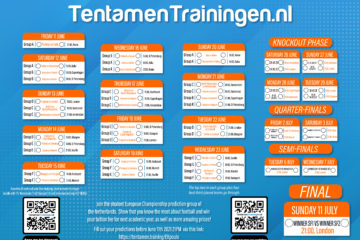At TentamenTrainingen.nl we think it is important that our teachers stay connected to us for a longer period of time. For this reason, we invest in the personal development of our team members (in this video our teachers tell us what they think of our teacher training). In addition to personal development, the salary is of course also a very important factor for employees to continue with teaching. At TentamenTrainingen.nl we are proud to be the best paying tutoring organization! In various cases, we even pay more than twice what teachers can earn from our competitors. And this is reflected in the quality of trainings
Fixed compensation
At TentamenTrainingen.nl we use different types of compensation models, ranging from a fully fixed compensation with a high degree of certainty, to a variable compensation in which you do not yet know exactly in advance what you will earn by providing your tutoring training. If you like certainty and certainty, you can choose a compensation model that fits this. At TentamenTrainingen.nl you can always choose a fixed fee that, partly depending on your experience, up to € 23 per hour. A nice compensation for a great job. But you can also choose a different model with us!
Variable compensation
In addition to a fixed compensation, you can also choose a partially fixed, partly variable compensation, or a fully variable reimbursement. We offer this possibility because we realize that different people are challenged in different ways. If you choose a compensation that depends on the turnover we achieve with your training, it is in our common interest to ensure satisfied, repeat customers who pass their exams. Below there is explained how the variable compensation works
Earn up to 30% of the turnover
If you, as an experienced teacher, choose a fully variable compensation model, you earn up to 30% of the turnover achieved with a training group. By turnover we mean in this case the sum of the amounts paid by the students for the training, minus the amounts paid by students who use our guarantee scheme. Students who do not pass the exam can use the “not pass, money back guarantee.” If a student does this, this lowers the turnover of the group.
A calculation example
Let’s count. Suppose you give a training group of 12 hours to a group of 15 students and you use the variable compensation model of a 30% turnover fee. The cost of the training is € 144 for the student. However, some students use a discount. Let’s say the students pay on average of € 130 for this training. Although you gave good training, two students did not pass the exam and appealed to our guarantee. The turnover, in this case, is therefore calculated by multiplying € 130 by 13 students. The turnover compensation, in this case, would, therefore, be 30% of the turnover, which amounts to an amount of more than € 500. Calculated back to the amount earned per hour, this is € 42 per hour. If your group has not made use of a discount, and all students pass (which fortunately often happens!) your hourly allowance even amounts to € 54 per hour!
Why we do this
We think it is very important that teachers stay connected to us for a longer period of time. Giving extra lessons is an “experiential job” and we see that teachers develop strongly in front of the class. We, therefore, want teachers to be connected with us as long as possible. By offering a choice in the reimbursement models, teachers have more influence on what they earn with their lessons. This gives a boost to the quality of our training, and we are happy to pay extra for that.
The pros and cons
Roughly speaking, you could say that about half of our teachers use the fixed compensation model, and the other half use the variable or partly variable model. New teachers often start with the fixed model, after which sometimes they switch to a different model. You can switch between models per exam period, so this is no problem at all. The most important advantages and disadvantages of the models are listed below.
Predictable versus unpredictable
The main difference between the models is that the fixed model provides certainty, and the variable model is more unpredictable. If a course is not very popular (for example, we expect no more than 7 students in the training), or we have just started to set up a course, it is advisable to choose the fixed model. After all, fewer customers mean less variable compensation. Together with your training manager, you can discuss the expectations for this training when planning your first training. Ultimately, you are always the one who makes the choice for a model, but the training manager can, of course, advise you on this.
Put money in your account quickly, or wait a while
If you choose the fixed model, we can usually pay you within two weeks after your last lesson. Sometimes it even takes only a week. If you use the variable model, this takes longer. The reason for this is that we first have to know how many students use our guarantee scheme before we know what the exact turnover of your group is. Partly depending on the university’s evaluation period, it may take another four to eight weeks after your last lesson before we can pay you. If you prefer to be paid faster, the fixed fee has a clear advantage in this area.
In summary!
This is a lot of information, so here are the most important points:
- As a teacher, you choose the compensation model yourself.
- The training manager can tell you more about the expected turnover for a specific study
- You can switch between compensation models whenever you want
- At TentamenTrainingen.nl you can earn more than € 50 per hour if the conditions are good!
More information & how to apply
Of course we will gladly give you more information about the work as a teacher! If you have any questions, you can contact Menke Jonge Poerink via menke@tentamentrainingen.nl. Of course, you can also apply immediately! This is possible via this link.


